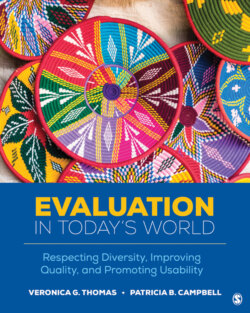Читать книгу Evaluation in Today’s World - Veronica G. Thomas - Страница 133
На сайте Литреса книга снята с продажи.
Voices From the Field
ОглавлениеStafford Hood: Toward a More Inclusive History of Evaluation
If we are going to tell the history of evaluation, then we must tell the whole story. A more inclusive evaluation history is critically important because it lets evaluators, particularly young evaluators of color, know that the field has a rich history and that their work stands on the shoulders of lots of other folks. I started by looking from the vantage point of my own heritage and roots as an African American and saw that we were truly part of the story of evaluation history, and that story needed to be told. In doing this work, what I found was fascinating inasmuch as during the early years of the 1930s and 1940s, African Americans were conducting evaluations using sophisticated methods such mixed methods, although they didn’t name it as such. There were African American scholars, such as Leander L. Boykin, Reid E. Jackson, Aaron Brown, and others, navigating the community, having a cultural reference, and providing examples of how to conduct large-scale evaluation studies. The work of early African American pioneers in evaluation illuminated stories of social injustice during that particular time through their evaluation work especially related to segregated schools. They were committed to doing work that was for “the cause” and work that was culturally responsive and socially responsible. Such evaluations provide examples of the struggles faced by African Americans to get this work done and the impact of that work. However, uncovering untold stories of evaluation’s early history does not stop here. We must continue uncovering the footprint of African Americans and other people of color in the history of evaluation.
Stafford Hood is the Sheila M. Miller Professor of Curriculum and Instruction and a professor of educational psychology at the University of Illinois at Urbana-Champaign, and founding director of the Center for Culturally Responsive Evaluation and Assessment (CREA). Veronica Thomas conducted the interview in the fall of 2019.
Hood and colleagues, in the evolving Nobody Knows My Name project, continue to research the historical contributions of African Americans who engaged in evaluation in the early years (prior to the 1954 Brown v. Board of Education Supreme Court decision). The title of his project was borrowed from Baldwin’s (1961) collection of essays under the title, Nobody Knows My Name: More Notes of a Native Son, because, as Hood (2017) points out, “it spoke more directly to what I felt after being told there were no early African American evaluators or simply that no one knew of any” (p. 263). The Nobody Knows My Name project was conducted to “retrieve, from near obscurity, the work of early contributors and pioneering African American scholars who have been excluded from what is taught as the history of educational evaluation research in the United States” (Hood, 2017, p. 263). In the sections that follow, we discuss some of the scholars that Hood and colleagues refer to in the Nobody Knows My Name project. Borrowing from the title of Shetterly’s (2016) book, we refer to these individuals as “hidden figures” in the field.
During the 1930s–1950s, African American scholars used their platform as a vehicle to carry their message of social inequalities and social responsibility to the research and evaluation community, in particular, and society, more generally. While the work of such scholars may not have had an impact on the evaluation theory and practice of their time, their work did “respond to a social agenda that addressed the intentional disentrancement and undereducation of African Americans during the period between Plessy v. Ferguson, where the Supreme Court declared the concept of separate but equal legal, and Brown v. Board of Education” (Hopson & Hood, 2005, p. 89). Work by these scholars also paved the way for the development, recognition, and use of more culturally responsive approaches to evaluation. Some of these scholars, such as Charles H. Thompson and Reid E. Jackson (both highlighted in this section), received doctoral degrees from elite centers for training in educational research and evaluation such as the University of Chicago and Ohio State. One common thread among such scholars is that they conducted and disseminated research and evaluation studies that offered evidence for the negative impact of racism, inequities, and legal sanctioning of segregation on the life outcomes of African Americans.
As part of our effort to highlight the identified “hidden figures” in this chapter, we included a photo for each.
Courtesy of the Moorland-Spingarn Research Center, Howard University Archives Howard University, Washington DC
